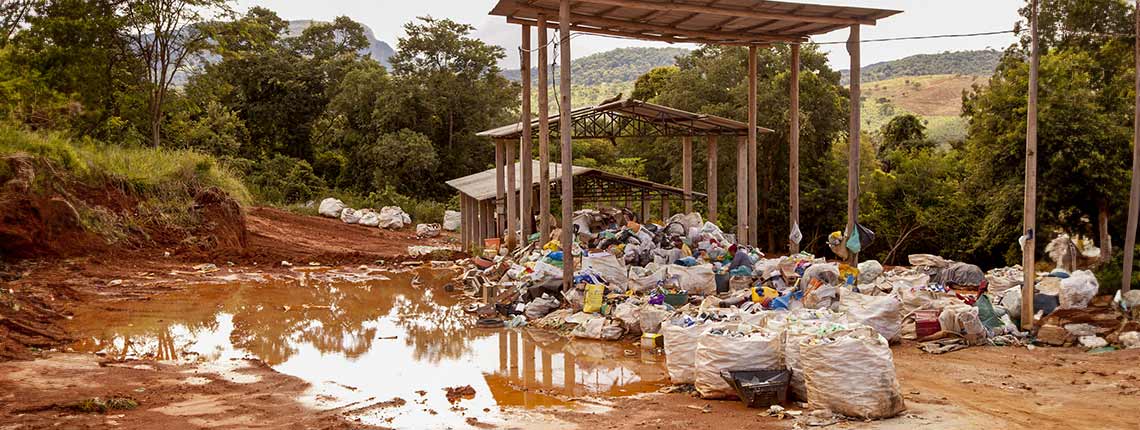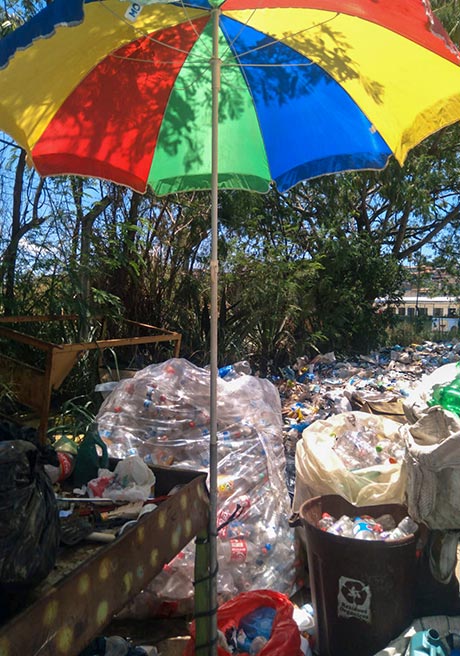
Also available in French, Portuguese and Spanish.
In urban areas grappling with climate change, waste pickers are on the frontlines. A new study highlights the vital role waste pickers play in managing urban waste and how they navigate the challenges of a changing climate in Brazil – from rising temperatures to shifting work conditions.
Extreme weather events and environmental disasters have gained more and more space in the news over the last few years globally. The climate emergency is of extreme concern to human health and well-being, with enormous social and economic costs.
Cities, due to population growth, increased pollutants, and diminishing green areas, bear significant responsibility for climate change. However, cities are also home to a large workforce of overlooked contributors to environmental sustainability: waste pickers in informal employment, known in Brazil as 'catadores de materiais recicláveis’ – a workforce dedicated to recycling discarded urban waste. Their integral role in reducing resource use and waste, is central to building circular economies and mitigating carbon emissions.
At the same time, waste pickers face direct challenges imposed by a changing climate, such as disruptions caused by heat waves, flash flooding and droughts. For example, for those working on the streets or in recycling centres, flooding and rain can directly affect their ability to work as well as reduce the quality of collected material, whereas heatwaves and rising temperatures impact directly on the health and life of waste pickers as they might face dehydration, fainting or sunburn.
Despite their crucial role, we know little about how waste pickers perceive climate change, its relevance to their work, and how they respond to the already noticeable changes in the environment in which they work. To fill this gap, WIEGO, in partnership with the University of Sheffield, conducted an exploratory mapping project in Brazil, which documented their perceptions and experiences in relation to climate change, in 2022 and 2023. The study included a survey of 93 waste pickers, participatory focus groups, and key informant interviews, providing detailed analyses into their everyday experiences in a changing environment.
A key finding of the study revealed that a substantial majority of the waste pickers (91% of those interviewed) have experienced one or more impacts attributable to a changing climate in the six months prior to the survey. This highlights that, for most waste pickers, climate change is already a lived reality. They voiced an understanding of how their work is intertwined with broader environmental conditions worldwide.

Despite these challenges, the study showed that waste pickers have developed a range of strategies to cope with the different impacts of climate change. For example, waste pickers working in cooperatives and recycling centres are mindful of the storage of paper and other usable waste that may lose value when becoming wet. Many waste pickers spoke of adapting their working patterns to the temperature conditions to deal with increasing temperatures in recycling centres and in the streets. Unfortunately, the study also shows that waste pickers have so far received limited support from existing institutions, and that when they have – such as donations of equipment, trucks, or alternative facilities to perform separation – it is provided ad hoc and temporarily. Cooperatives offer some assistance, but they fall short of addressing the multifaceted precarity faced by waste pickers, particularly those who are not organized and tend to be excluded from support offered by local governments.
Central to the methodology of the research was for the project team to actively engage in a dialogue on climate change with waste pickers in cooperatives and with non-organized waste pickers over several months. Aligning with principles of action research, the project included facilitated learning discussions post data collection to strengthen waste pickers’ understanding of the language of climate change. The intent of the learning component was to work together to highlight how waste pickers' contribution to reduce both their workplace vulnerability and carbon emissions should be recognized widely.
Another significant feature of the project was a policy dialogue co-organized with the municipality of Belo Horizonte, the National Movement of Waste Pickers (MNCR), and the Prosecutor’s Office for Minas Gerais state. Here we shared and discussed findings with workers and key stakeholders. During this event, the Prosecutor’s Office signed a commitment letter with WIEGO, for the use of WIEGO’s GHG calculator. Another letter was signed between the Municipal Waste & Citizenship Forum – a multi stakeholder platform composed of waste pickers – local government officials and civil society, and WIEGO, in which the Forum committed to working towards documenting climate change impacts in waste pickers’ cooperatives in Belo Horizonte.
The study underscores that cities have a unique opportunity to shape a just transition by incorporating waste pickers' experiences and addressing their sector-specific demands in climate change adaptation plans. Recognizing and building resilience for workers in informal employment not only benefits them but also contributes to the overall resilience of the city. The time for climate action is now.
Top photo: Unicicla cooperative in Nova União city, January 2020. Poor infrastructure exacerbates the impacts of climate change. Photo credit: Murilo Godoy
Read the new WIEGO study about Brazilian waste pickers and climate change
Related Posts
-
Informal Economy Topic
-
Occupational group
-
Language
